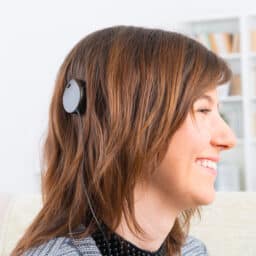Should You Wear a Hearing Aid and A Cochlear Implant?

A cochlear implant is an electronic device that is surgically implanted behind the ear. It sends electrical impulses to the hearing nerve, resulting in better hearing clarity, particularly speech. A hearing aid is placed on or in the ear and amplifies sounds so the sensory sounds can be stimulated properly for hearing. Depending on your…
Grocery Shopping With Hearing Loss

Grocery shopping is an essential, everyday task, but it could be more difficult for those with hearing loss. Nearly 30 million people have hearing loss in one or both ears based on standard hearing tests, so its can be a stressful experience for many individuals. Since many typically think of grocery shopping as a primarily…
What Are Low-Gain Hearing Aids and Are They Right For Me?

If you have hidden hearing loss or auditory processing disorder, you may be wondering what treatment options could be right for you. Low-gain hearing aids could be an effective option. Low-gain hearing aids are just like a normal hearing aid you’d be fitted with if you have hearing loss, just adjusted to provide less volume…
Should You Join a Hearing Loss Support Group

If you’ve recently been diagnosed with hearing loss or have experienced hearing loss for some time, you may have heard about hearing loss support groups. Living with hearing loss can feel isolating, and joining a support group could provide you with advice and resources to navigate the condition. If you’ve struggled to hear your coffee…
Tips for Better Driving With Hearing Loss

There are currently more than 1.5 billion people living with hearing loss worldwide. Hearing loss can adversely impact all parts of our lives, and driving is no exception. Driving is one of the most dangerous things people do on a daily basis. Let’s take a look at a couple of tips for staying safe while…
What Are the Most Common Causes of Hearing Loss?

Nearly 20% of the global population live with hearing loss, accounting for more than 1.5 billion people. Hearing loss can occur for many reasons, but some of the most common include hazardous noise exposure, aging and physical trauma to the ear canal. Hazardous Noise Exposure Hazardous noise exposure is one of the most common causes…
Tips for Cooking With Hearing Loss

Approximately one in eight people in the U.S. aged 12 and over has hearing loss in both ears. Hearing loss impacts many aspects of our lives, and cooking is no exception. Whether the bubbling of water, the beeping of the kitchen timer or the sizzling of oil, the sounds of cooking tell you a lot…
What to Do if Your Hearing Aids Get Wet

Hearing aids are remarkable devices that collect and amplify sound directly into the ear canal, making everyday communication much easier for those with hearing loss. Whether they’re your first pair of hearing aids or your fifth, knowing how to care for your devices if they get wet is an important part of ensuring you can…
Common Misconceptions About Hearing Loss

Even though hearing loss is a common condition, there are many misconceptions about it. Unfortunately, these may be preventing people from getting the treatment they need. More People Would Benefit from Hearing Aids Only a fraction of people who would benefit from hearing aids actually use them. According to statistics from the National Institute on…
Can Family History Increase Your Risk of Hearing Loss?

Many factors can contribute to hearing loss. Most factors can be placed in one of the two following categories: Family history-related hearing loss falls under congenital causes. To better understand the connection between family history and hearing loss, let’s examine both genetic and overall health as contributors to hearing loss. Hearing Loss Passed On Through…


